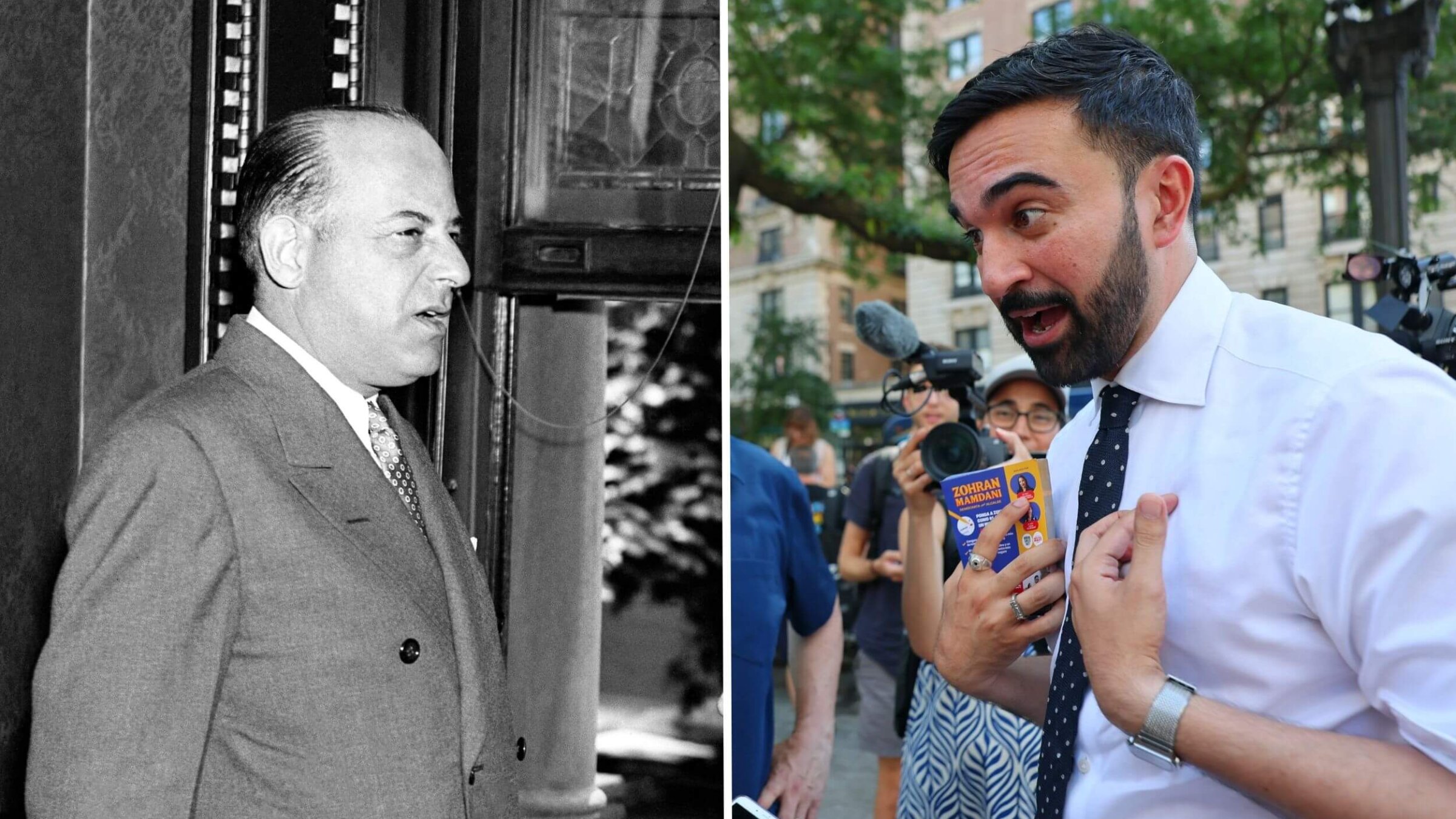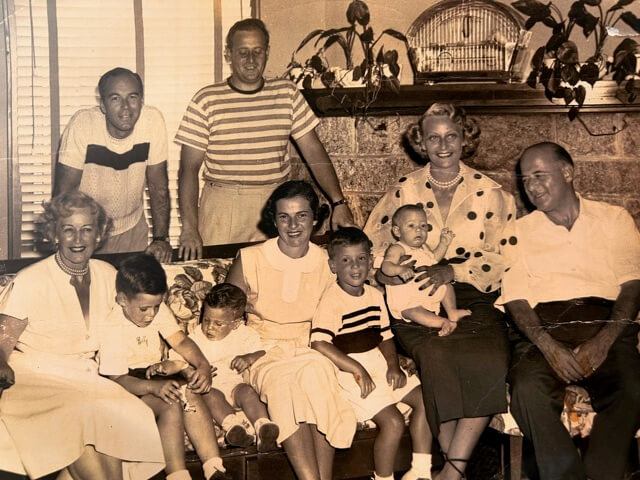How my Jewish great-grandfather paved the way for Zohran Mamdani — and Donald Trump
The language being used to attack Mamdani sounds a whole lot like what my great-grandfather experienced in the 1930s

Irwin Steingut, the writer’s great-grandfather (left) and New York State Rep. Zohran Mamdani, winner of the 2025 Democratic mayoral primary in New York City. Photo by Irving Haberman/IH Images and Michael M. Santiago via Getty Images
Zohran Mamdani reminds me of someone: My great-grandfather, Irwin Steingut, the first Jewish speaker of the New York State Assembly.
Irwin died decades before I was born, but he’s always loomed large in my imagination. Like Mamdani, he was an upstart from one of New York City’s thriving immigrant communities; built his political career around fighting for working-class New Yorkers; and understood that in this ever-evolving and beautifully chaotic metropolis, the time sometimes comes for one ethnic minority to boost up another.
Irwin’s own political career was launched in just that way: He first ran for office when he was only 28 years old, thanks to an Irish Democratic Party boss named John McCooey, who decided it was time for a Jew to represent Crown Heights. He hand-selected Irwin, who was born on the Lower East Side in October, 1893, as his candidate; Irwin took office in 1922, and served in the New York State Assembly until he died 30 years later. In 1935, he became the Assembly’s speaker — a rare milestone for Jews in New York politics, and one that I imagine made him feel like we, as a people, might one day overcome the antisemitism that was then surging violently in Europe — and also in the U.S..
I think if Irwin were here today, the prospect of his beloved New York City electing its first Muslim mayor would fill him with hope. Not just because he’d see something of his own son-of-an-immigrant-makes-good trajectory in Mamdani, but because he would see his own staunchly progressive, empathetic values, too.
Irwin became one of the most powerful political bosses of his time — even becoming a close friend of Franklin Delano Roosevelt when he was governor of New York, a bond that lasted through Roosevelt’s presidencies — all while championing progressive policies like rent control and social security. And while Irwin himself was a lifelong Democrat who ran against Socialist candidates, I see Mamdani, who is affiliated with the Democratic Socialists of America as well as the Democratic Party, as a fierce defender of the same values my great-grandfather held dear — despite the fact that my great-grandfather became a consummate Democratic Party insider, while Mamdani is seen as an outsider laying siege to the party’s sclerotic norms.

The clear throughline between these two men is their belief that taking care of all people, equally, is the most important role an elected leader will ever have.
When Roosevelt, as president, introduced the New Deal, many of his opponents called it communism. Some things never change: President Donald Trump — whose father, Fred, curried favor with Irwin as he began building his real estate fortune — called Mamdani a “ communist lunatic” only a few days ago.
The differences between communism and democratic socialism — the ideology to which Mamdani actually subscribes — are well defined. Communism envisions an end to private ownership, whereas socialism is a belief in “enough for everyone” — including free or basically affordable healthcare, quality free education, and a robust social safety net. (Full disclosure: I have identified as a Democratic Socialist since the 1990s, way before it was cool. And while I’m disgusted by Irwin’s accidental role in laying the groundwork for Trump’s dangerous, disastrous presidency — shaped by anti-immigrant, authoritarian policies that are wholly incompatible with Irwin’s own — through his support for Fred Trump’s business empire, I know that I can’t build a time machine to whisper into his ear and warn him about what he was about to do.)
New York is a city made by and for immigrants. Their stories, food, art and culture are the living fabric of our day-to-day lives, with each generation working hard to pave the way for the next. I have always been proud of the ways in which my great-grandfather embodied this legacy. When I was in fourth grade, my grandmother presented me with a red leather photo album — with my middle name, Iris, which I was given in honor of Irwin, embossed in gold on the front — that contained only two photos. One was of Irwin, half-smiling, in his official portrait for the State Assembly. And the other was of Roosevelt, signed by the man himself, with a note to my great-grandfather that read: “For my good friend Irwin.”
The message that I took from that, as a child, was that our family believed deeply in the values of the Democratic Party, because it was a party that embraced people who were constantly othered by society — people like Jews, and immigrants — and allowed them to lead.
Mamdani’s spectacular launch into the public imagination during the primary campaign is a reminder of that sacred promise. When my grandmother told stories about Irwin, tears of pride swelling in her eyes, it was often about the way her father was able to rise above rampant antisemitism to win a seat in the Assembly. In 1938, Irwin helped lead an Assembly inquiry into Nazism in New York, during which effort Carl Nicolay, a leader in the American Nazi movement, told him to his face “There are too many Jews in government positions.”
As I watch the eruption of hate and fear around Mamdani, a Muslim man, I wonder if he feels some of what my great-grandfather must have felt when he first ran, knowing that many of the people in his city probably thought he was nothing more than a “dirty Jew.” Mamdani has been called a jihadist; accused of planning to start an Islamic Caliphate; smeared with the baseless claim that he “hates Jews”; and in the most outrageous act of ignorance of all, called upon to be deported and denaturalized by Republican Representative Andy Ogles.
I would hope that my Jewish siblings, even the ones who strongly disagree with Mamdani’s views on Israel, are able to see from the history of our own political trajectory in this state and city how much of this rhetoric is hateful, cruel, and antithetical to progress — and most importantly, not remotely a reflection of what Mamdani has actually said.
I like to think that Irwin, who worked so hard to uncover the roots of pernicious, violent hatred toward Jews in New York, would have been able to see that difference. I hope he would have agreed that the scourge of antisemitism is inextricably linked to the scourge of Islamophobia, something I have always believed deep in my heart. As Comptroller Brad Lander, the highest-ranking Jewish elected official in New York City, put it on primary night, “Jewish New Yorkers and Muslim New Yorkers are not going to be divided against each other. Our safety, our freedoms, our thriving are bound up together. Don’t get it twisted.”
















